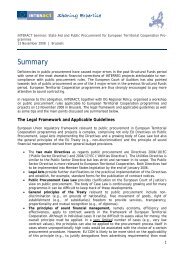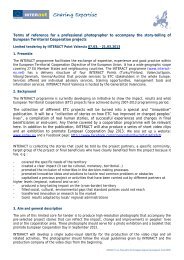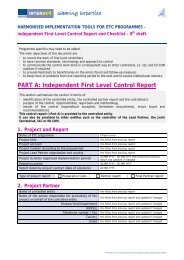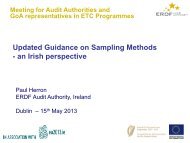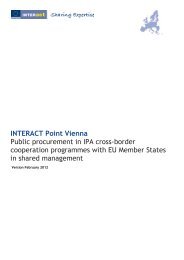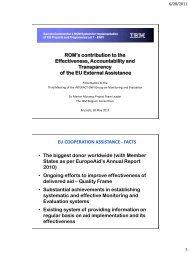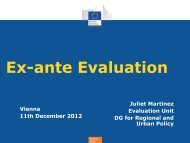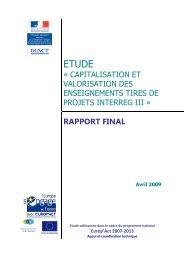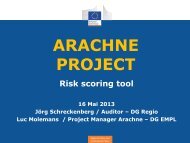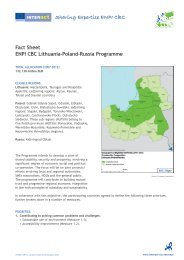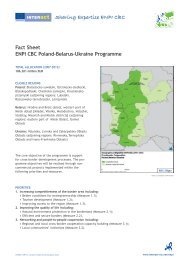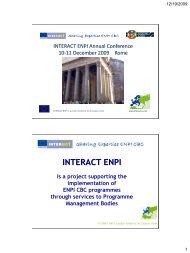VADEMECUM COMMUNITY RULES ON STATE AID - Interact
VADEMECUM COMMUNITY RULES ON STATE AID - Interact
VADEMECUM COMMUNITY RULES ON STATE AID - Interact
Create successful ePaper yourself
Turn your PDF publications into a flip-book with our unique Google optimized e-Paper software.
(d)<br />
Effect on competition and trade:<br />
Aid must have a potential effect on competition and trade between Member States. It is<br />
sufficient if it can be shown that the beneficiary is involved in an).economic activity and that<br />
he operates in a market in which there is trade between Member States. The nature of the<br />
beneficiary is not relevant in this context (even a non-profit organisation can engage in<br />
economic activities).<br />
The Commission has taken the view that small amounts of aid (de minimis aid 2 ) do not have a<br />
potential effect on competition and trade between Member States. It therefore considers that<br />
such aid falls outside the scope of Article 87(1) of the Treaty.<br />
This brief description of the criteria defining State aid shows that the scope of Community<br />
State aid rules is wide (but not open-ended).<br />
3. EXEMPTI<strong>ON</strong>S FROM THE BAN <strong>ON</strong> <strong>STATE</strong> <strong>AID</strong><br />
According to Article 87(1) of the Treaty, aid measures that satisfy all the criteria outlined<br />
above are, in principle, incompatible with the common market. However, the principle of<br />
incompatibility does not amount to a full-scale prohibition. Articles 87(2) and 87(3) of the<br />
Treaty specify a number of cases in which State aid could be considered acceptable (the socalled<br />
“exemptions”). The existence of these exemptions also justifies the vetting of planned<br />
State aid measures by the Commission, as foreseen in Article 88 of the Treaty. This article<br />
provides that Member States must notify to the Commission any plan to grant State aid before<br />
putting such plan into effect. It also gives the Commission the power to decide whether the<br />
proposed aid measure qualifies for exemption or whether the “State concerned shall abolish or<br />
alter such aid”.<br />
In the context of Structural Funds operations, the most relevant exemption clauses are those of<br />
Article 87(3)(a) and 87(3)(c) of the Treaty:<br />
• Article 87(3)(a) covers “aid to promote the economic development of areas where the<br />
standard of living is abnormally low or where there is serious underemployment”;<br />
• Article 87(3)(c) refers to “aid to facilitate the development of certain economic<br />
activities or certain economic areas, where such aid does not adversely affect trading<br />
conditions contrary to the common interest”.<br />
In exercising its powers, the Commission has developed specific approaches depending on the<br />
size of the firm, its location, the industry concerned, the purpose of the aid, etc. In order to<br />
ensure transparency, predictability and legal certainty the Commission has made public the<br />
criteria it uses when deciding whether aid measures notified to it qualify for exemption. These<br />
publications have taken the form of regulations, “communications”, “notices”, “frameworks”,<br />
“guidelines”, and letters to Member States 3 .<br />
2 See annex: factsheet on the de minimis rule.<br />
3 All relevant regulations, communications, notices, frameworks and guidelines are available on the<br />
DG Competition web site: http://ec.europa.eu/comm/competition/state_aid/legislation/.<br />
4



